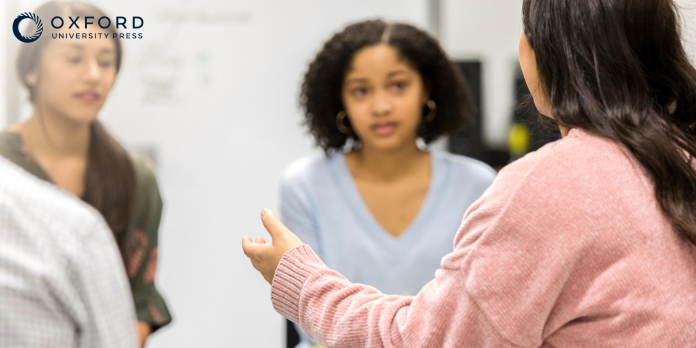What is mediation in the context of English language learning? In simple terms, it’s the process where students understand, relay and adapt information or ideas.
Previously, we discussed ways to develop mediation skills among learners. Today, we delve deeper into using mediation to develop integrated skills – Reading, Writing, Speaking and Listening – while addressing the varied abilities and unique learner differences within the classroom.
Integrating skills
When planning lessons, it’s common to combine receptive skills (Listening and Reading) with productive skills (Speaking and Writing). This approach is beneficial as learners often need to convey ideas and information they’ve understood from various sources.
But how can you also incorporate mediation into activities to develop integrated skills?
Learning objectives
It is important to establish clear ‘can-do’ statements to help students understand their objectives for each task or lesson, and know what skills they will be developing. This helps provide a sense of direction and accomplishment once they know they have achieved their objectives.
Activities for developing integrated skills
The key to using mediation to develop integrated skills is to structure activities with different phases. This allows you as the teacher to pinpoint where to emphasise each skill.
For example:
- Think about a classroom presentation task. Initially, students need to do research or gather information. During this phase, students might be practising their Reading or Listening skills to understand the information they have found.
- Then, students prepare their presentation. During this phase, they are Speaking and Writing and retelling the information they have learnt.
- When students deliver the presentation, they are also practising their productive skills.
Another activity to use mediation to develop integrated skills is to:
- Put students into pairs. If you teach a multilingual class, try to pair up students from different countries or cultures.
- Have students use their Speaking and Listening skills to discuss something from their partner’s country, e.g. a recipe, a news story, traditional clothing, a celebration or a special day etc.
- Students then research that information in more detail, to later relay to another student in the class. During this information-gathering phase, students are developing their receptive skills – Reading and Listening. They might even be Writing, by taking notes.
- Students work with a different partner to relay what they found and present their findings.
Assessment
You should regularly assess your learners and identify any areas where there’s an imbalance in skill focus, to ensure a well-rounded development of the four key skills.
Many English language assessments or in-class reviews, effectively evaluate mediation skills. This is done by incorporating tasks that require students to use their language abilities to facilitate understanding and communication between parties.
For example:
- A task which requires learners to evaluate different points, then choose and discuss which option is the best – Reading and Speaking
- An activity which provides students with context of a situation, which they then must write about (e.g. a proposal for an event that accommodates a diverse group of cultural backgrounds) – Reading and Writing
- A task where students listen to different perspectives and need to choose which scenario is best suited to each person, based on their needs – Listening and Writing
Catering to individual differences
Mediation abilities may be different according to individual students. Students vary in how naturally they mediate, even in their first language. Some may excel in mediation activities in English, while others might need additional support.
This is where peer support becomes invaluable.
- Encourage more proficient learners to assist their peers. This not only helps the student who is struggling but also enhances the mediators’ skills.
- You can encourage this by pairing up students of different abilities or levels.
However, you can also take the approach where lower-level learners take charge.
- Once the mediator has relayed or explained the required information, have the lower-level student ‘assess’ the effectiveness of the mediation.
- For example, have students think about the following: Was the information clear? Were you able to understand all of the main ideas? Was the language simple enough? What would you have done differently?
In summary
By focusing on mediation to develop integrated skills and individual differences, we equip students with the ability to not just understand but also effectively relay and adapt information across various contexts. By using these techniques and tools, you can foster a more inclusive, effective and engaging learning environment for your students, whilst developing them into real-world mediators.
Want to know more about mediation? Find out more in our focus paper here.


